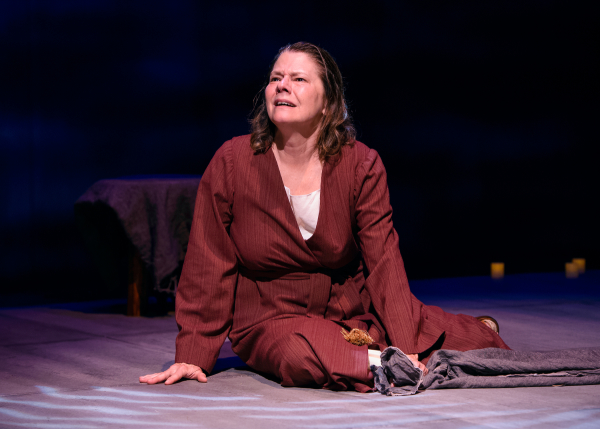The Testament of Mary
Victory Gardens Theater gives voice to a saint long sublimated by the religious patriarchy.

(© Michael Courier)
Deeply subversive and wholly intriguing, playwright Colm Tóibín’s solo play The Testament of Mary is a tour de force for actor Linda Reiter and a radical, welcome rethinking of one of the planet’s most iconic figures and the world’s most historically influential books. The Midwest premiere of Tóibín’s riveting 90-minute drama offers a crucially important counterbalance to millennia of patriarchal dominance and male perspective. It is also a gripping piece of storytelling.
As brands go, the Virgin Mary is one of the world’s most ancient and powerful: A serene, saintly Madonna, a luminous and beatific presence draped in baby blue and surrounded by a gently golden aura. Look at any artist’s rendering of her and you’ll see a wondrous example of youth, innocence, (literally) glowing maternity, and unquestioning obedience. All that changes in The Testament of Mary. Directed by Dennis Zacek, the Victory Gardens production reveals a complicated woman, prickly, outspoken, long past child-bearing years, and still reeling with inconsolable grief and rage over the death of her beloved son.
Schooled on the particulars of Jesus’ conception as they are laid out in the Bible, Mary displays a mix of disbelief and exasperation. "I was there," she reminds her visitors witheringly. Informed that her son died to save the world, Mary’s howling, anguished response is one that will stay with you long after the curtain comes down. What Mary lacks in Tóibín’s drama is any patience whatsoever with the men who have co-opted her story for the good of mankind. And, when a pair of unseen and unheard Evangelists comes to call, her reaction to them isn’t unlike the righteous fury a bereaved parent might express when told they should be joyous because God now has one more angel in Heaven.
Zacek’s direction propels the show in a slow, burning crescendo. Reiter’s performance evolves from smoldering to outright fiery over the course of this tightly paced narrative. The imagery that Tóibín evokes is harsh and unforgettable. Mary’s recollection of the Crucifixion and its crowd-fueled bloodlust mercilessly conjure the horrific physical mechanics of that barbarous means of death. Her memories of a caged bird feasting on live terrified rabbits during the deathwatch is both a vivid metaphor and the stuff of scourging nightmares.
Mary addresses other familiar Bible stories as well. Her sense of looming danger is palpable as she describes the resurrection of Lazarus and the transformation of water into wine at the wedding in Canna. Reiter radiates a sense of wonder as well as fear — the miraculous tempered with a sense of escalating foreboding. Throughout, sound designer Andre Pluess’ rippling currents of audio and Michael Rourke’s flickering lighting design create a backdrop that’s both eerie and delicately beautiful.
One thing The Testament of Mary is not is irreverent. Tóibín is not dismissive of Mary’s keystone place in the foundation of Christianity. Instead, he depicts her as a vital and intensely relatable flesh-and-blood being, a woman you can empathize with even though she is a canonized saint.








